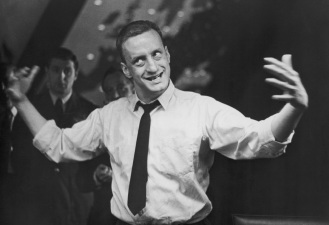An insane general triggers a path to nuclear holocaust that a War Room full of politicians and generals frantically tries to stop.
Stanley Kubrick brilliantly satirized the Cold War tensions between the US and Russia in Dr. Strangelove, a black comedy that he wrote, directed, and produced. Even more brilliant, he criticized the ridiculous idea of mutually assured destruction.
The concept of mutually assured destruction, or MAD for short, is front and center in this film. When the US informs Russia that a crazed, conspiracy driven general has triggered plans for nuclear war, Russia informs the United States that they have created a Doomsday Machine and that this machine cannot be stopped once triggered. Therefore ensuring that everybody will die. The ridiculousness of MAD is repeatedly emphasized with the conversations had by those in the war room.
The War Room is the setting of the bulk of the film. It’s where all the United States leaders in the government and in the military meet to figure out how to stop “Wing Attack Plan R”, the plan that insane General Jack Ripper put into motion. It is here that the soviet ambassador, Alexei de Sadeski, is brought, even though, in the words of George C. Scott’s character General Buck Turgidson, “he would see everything. He would see the big board!”

Have I mentioned yet that the President of the United States’ name in Dr. Strangelove is President Merkin Muffley? Have I also mentioned that the president is just one of three characters that Peter Sellers plays? Sellers plays the president, Group Capt. Lionel Drake, and Dr. Strangelove himself. Each performance varies so greatly that it truly is impressive to watch. The transitions between characters feel so seamless. My favorite out of all three characters is Dr. Strangelove, largely in part because his very presence in the war room hints at Operation Paperclip, which I just find hilarious.
 George C. Scott, as I mentioned above, plays General Buck Turgidson. Scott is clearly overacting in nearly all of his scenes, but it works so well with the tone of the film. It easily becomes one of the best performances in the film.
George C. Scott, as I mentioned above, plays General Buck Turgidson. Scott is clearly overacting in nearly all of his scenes, but it works so well with the tone of the film. It easily becomes one of the best performances in the film.
The dialogue in this film is a whole other monster entirely. It is very quick witted, with a number of one liners, most famously “Gentlemen, you can’t fight in here. This is the war room.” But, what stands out to me the most, is the telephone conversations between President Merkin Muffley and Soviet Premier Dimitri Kissov. These conversations, although the topic is about something literally world ending, are so nonchalant. They sound like old friends catching up, or annoyed family members. It is absolutely brilliant.
Honestly, I hate that this film is still relevant today in some aspects. Sure, the Cold War is over, but the threat of nuclear war has been more present this year than I am comfortable with. Those in the government and armed forces believing in conspiracy theories, much like General Ripper and his belief in Fluoridation, is even more relevant this year. The way that the US government is handling certain crisis’s is very similar to the way the crisis is handled in Dr. Strangelove, in that it isn’t handled at all and everyone dies.
Anyways, this film deserves to be on the AFI list, no doubt. It’s a brilliant dark comedy and will continue to stand the test of time.

